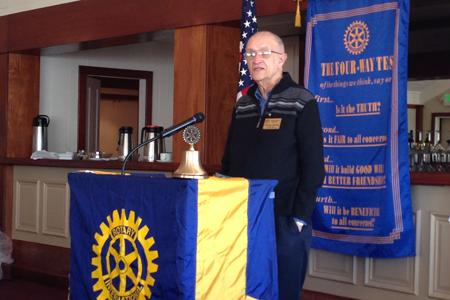Weekly Luncheon January 16, 2013
(REDONDO BEACH) January 16, 2013 --- Lots of announcements this at this week’s luncheon. But first to our visitors: Eric Conrad, Andrea Conrad and Mike Welch from the Hermosa Beach Rotary Club, and Connie Siegel from the Hershey (PA) Rotary Club.
Now for the announcements:
On February 9, 2013, the PV Sunset Rotary Club will host a Chinese New Year gala at the Empress Pavilion. To be followed on February 16 for the 114th Golden Dragon parade. Contact Angi Ma Wong at 310-541-8818 if you wish to participate!
On February 11, 2013, the Manhattan Beach and Lennox/Hawthorne/LAX Rotary clubs have scheduled a 7:15 am breakfast with RI Director Ken Boyd as the speaker. The meeting will be at the Manhattan Beach Marriott Hotel. Our club has reserved 10 seats for the event. Cost is $25.00.
On March 9, 2013, LMU will host the District 5280 Art, speech, and music and dance competitions. Our club is hosting a dance company and we need volunteers to attend. See Bill Gard if you are interested.
Also on March 9th, the Rotary Community Alliance is offering a tour of Camp Pendleton. We will travel by motorcoach. See PDG Chuck Anderson.
Meanwhile, also on March 9th (a busy Rotary Day!) the Ethics Leadership Enterprise Seminar will be held at the Double Tree Hilton Hotel in San Jose. See Nancy Campbell if you are interested. Cost is $95.00 per person.

Dr. Rolando Andrade discuss Mexican American History
Our scheduled speaker from Showtime cancelled his appearance. President-elect Rolando Andrade stepped in and gave a presentation about this history of the Southwest. Andrade is a former professor of history at Bowling Green State University in Ohio.
He said the Spanish government originally had no interest in the region, which was described as “The Spanish Borderland Frontier.” Rolando went on to explain the transition of the Southwest from Mexican to American territory. “It began in Texas where Stephen F. Austin requested a land grant for 300 individuals,” he said. “The Mexican government was willing to grant lands to American citizens in Texas on three conditions. First, those who accepted the free land had to be Roman Catholics as ordered in the Mexican Constitution; second, they had to accept the Mexican government or citizenship in the new country; and, third, they could not bring slaves to the Texas territory. They accepted these conditions, but rebelled and claimed they were fighting for freedom. To have slaves?” Interestingly, Andrade added, at the time it was believed that much of the region, primarily California, was an inland, bordered on the west by the Pacific Ocean and on the east by the Colorado River.
Our speaker next week will be Raiko Sakata, Rotary Water Project, Myanmar.
